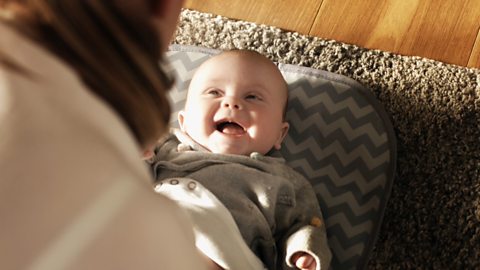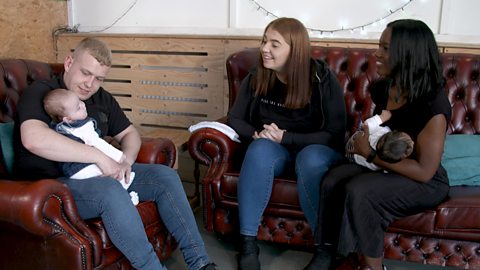Interacting with your newborn is an exciting experience, but can also be rather daunting.
“You've just given birth, you’re a bit overwhelmed and you’re tired. These are all barriers when it comes to interacting with your new child,” says physiotherapist Penny Walsh, “It's just about bringing it back to something joyful between you and your baby.”
We spoke to occupational therapist Lindsay Carr and physiotherapist Penny Walsh, to explain more about why play is so important with your newborn.

What age can I start playing with my newborn?
When you think of play, you might picture older children playing with toys or games. But for a newborn, when every single experience is new and exciting, play can anything that is stimulating for them!
“Even when in their mother's womb, babies are experiencing quite a lot of sensory information,” says Lindsay, “They are hearing mother’s heart rate, experiencing all that movement and physically pushing against boundaries around them, so they're getting a lot of sensation and a lot of feedback about the space they are in.”
Post-birth, you can start introducing play into your baby’s routine with small, everyday interactions.
Penny explains that, “the kind of play after birth would be keeping them quite close and supported by you initially. So skin-to-skin, touching and talking to your baby will help to not only develop that relationship between the two of you, but also develop your confidence with holding them and moving them.”
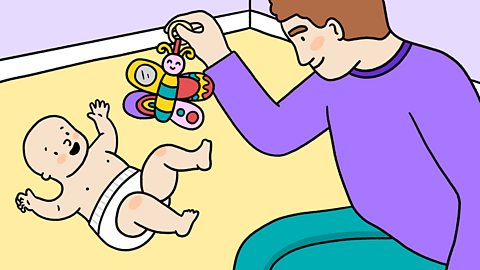
What are the benefits of playing with my baby?
Play at an early age not only helps your little one’s cognitive development, but also their physical and emotional development.
Think of all the different positions you put your baby in. You might hold them in the air dancing with them, close to your chest during cuddle time, or laid on their backs playing baby aerobics. All of these movements help babies to strengthen different muscle groups so they can support themselves.
Those different positions also help your baby learn to see the world from a different perspective.
Play helps them to know where they end, and where the rest of the world begins.
“Being able to see what the world looks like on their tummy versus what it looks like on their back helps to build their visual skills and perception,” says Lindsay, “it's all giving them the experiences that they need to be able to build a picture of what the world is.”
What play activities can I do with my baby?
Newborns spend most of their time lying on their back or in your arms, so use this time to start interacting with them. This could be by talking to your baby during your everyday routines like nappy changes, singing while feeding or using colour or noises to simulate their senses with sensory play.
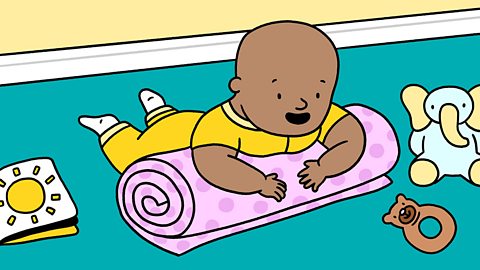
Tummy time is not only a great way to entertain your baby and give them a new experience, it's also great for their physical development. Lying on their stomach is important for them to build up their muscles and strength that your baby will eventually need for sitting and crawling.
Tip: Remember to be guided by your baby as tummy time can be difficult for them to get used to.
“Short periods of play, lots of times throughout the day is perfect,” says Lindsay.
Penny also adds, “if they're getting upset by being in a certain position, then try tummy time a different day, or when they're in a playful mood, or do a different play technique. Remember, if they cry one time, it doesn't necessarily mean that they'll cry again when you try another time.”
How does play help with language learning?
During play, babies make all sorts of noises and sounds. They might squeal, giggle, babble or gurgle.
Studies show that when babies hear speech, the parts of the brain that control mouth movement become activated. This happens even before they can talk. Try babbling back to them when they make noises to help develop their speech.
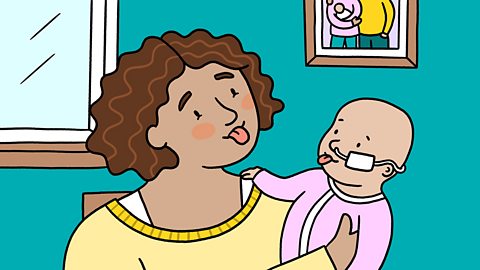
Often it’s during play that babies understand they can communicate for the first time and that, actually, there's a purpose to the noises that they might make.
Babies are learning to link the noises that come from you speaking to the shapes your mouth makes when you speak. They are processing how to move their own tongue and lips to make noises.
“Baby talk is great to encourage those achievable noises,” says Penny. “Babies like to imitate your movements, expressions, and your noises, which helps encourage those fine motor skills used in speech.”
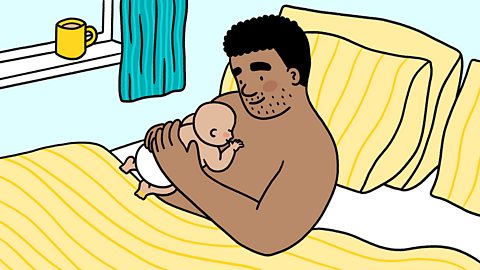
Penny and Lindsay’s top tips for newborn play
1. Change your perspective of play
“We need to have an understanding of what play is for a newborn. It is just any interaction: it's singing songs, looking at each other and pulling faces. Just joyful bonding stuff, that is play,” says Penny.
2. Little and often
Lindsays explains that, “incorporating play in short bursts throughout your day will help it become a part of you and your baby's normal routine. Make it achievable and fun for the both of you!”
3. Keep it simple
The toy market for babies is huge, but your newborn doesn’t need anything expensive to get them engaged. Penny tells us, “in the hospitals we work in, we see a lot of cots full of teddy bears and toys but actually the most important toy is you!”
4. Every baby is different
There is huge variation in when babies develop and progress with their language learning as well as their physical development.“There are guidelines and advice on when skills may develop in your child, but it's not a hard and fast science. There isn’t a rulebook and if you are concerned about their development, seek advice from your health visitor.”
5. Lean on your support network
Having a newborn can be difficult at times, and other factors may be affecting you post-birth whether it’s sleep deprivation, dealing with a traumatic birth or the struggle to adapt to a new routine.
“Find support from other people in your local network that might be going through the same challenges if you're finding it really difficult. For whatever that challenge might be, there is support out there for you,” says Lindsay.
Further information
Penny Walsh and Lindsay Carr work for The Newcastle Upon Tyne Hospitals NHS Foundation Trust on campaigns, and The campaign focuses on children who are in hospital long-term and are at risk of experiencing delays in developing important skills for movement and play.

